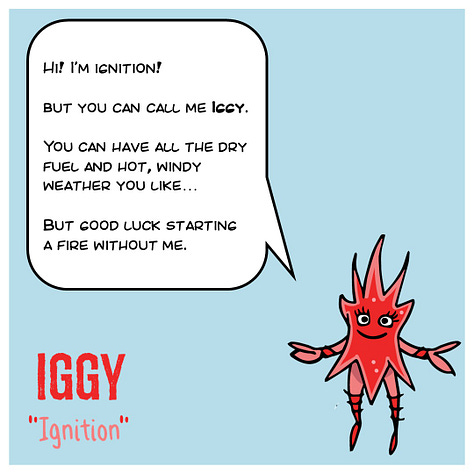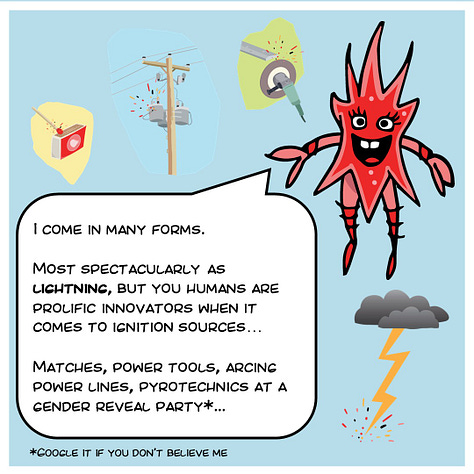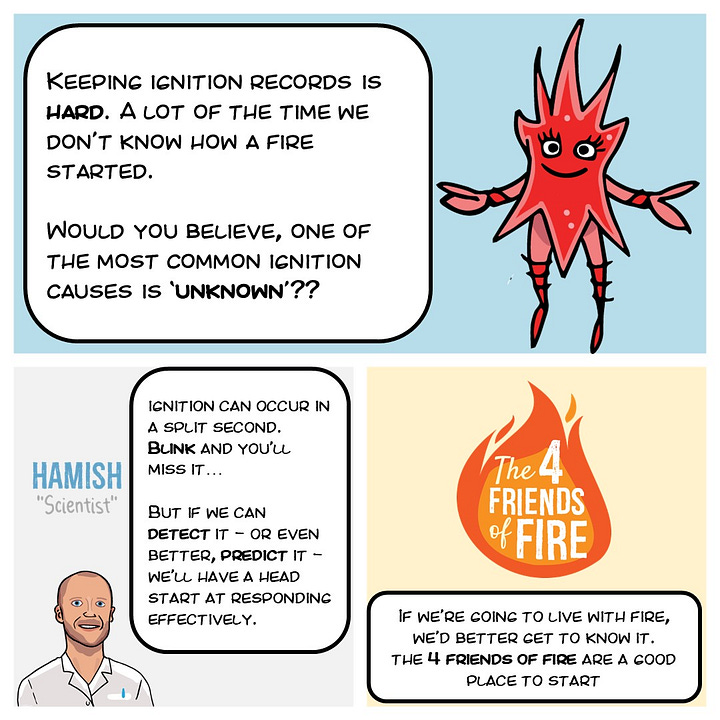Summer Reading With Future Fire
What I've been reading and writing
Happy New Year, readers!
We’ve now made it a quarter of the way through the century, which is a modest feat for an opener but pretty good going for humanity given what the last 25 years have thrown at us. I’ve written previously about the difficulty of predicting the future, but I still feel confident in saying we’ll need to knuckle down and forge a few good partnerships if we’re any chance of getting to a half ton. We’ll also need to take full advantage of any breaks the schedule affords us, whether they’re tea breaks, lunch breaks, Christmas breaks or/and summer breaks.
And what better way to enjoy a break - nay, what better way to get through this thing called life - than by reading?
~~~
Let’s start with the December 2024 edition of BAMOS, the Bulletin of the Australian Meteorological and Oceanographic Society. After a kind invitation from the editor Laure Poncet, I was thrilled to make my fourth appearance in its esteemed pages with an instalment of the ongoing comic book adventures of the Four Friends of Fire.





The good folk at AMOS have made the entire archive available, so you can check out not only Iggy, but Wes and Des (Vol 33, Issue 4 and Vol 34 Issue 2) and also my conference report from attending Science Meets Parliament as a PhD student waaaay back in March 2014. Who would have thought that the writer of these words would soon be the writer of these words (if you catch my drift). Here’s an extended excerpt.
My interest in these matters stems partly from the fact that I have one foot in government and another in science. Most attendees had both feet and most of their ankles purely in science, so were perhaps more interested in learning how to spread the word about their field, whether it was to the general public or a purse string-holding politician.
Scientists then had a chance to let their hair down at the gala dinner in the great hall of Parliament House. I enquired with my hotel receptionist what “lounge suit” dress code meant and was saddened to discover I had not packed in accordance with the code. Happily I was still admitted and got to rub shoulders with national treasure Robyn Williams, Nationals Senator Bridget McKenzie, National Computational Infrastructure bosses and a great number of scientists.
With my shoulders still sore from all the rubbing, I found myself outside Parliament House shortly after sunrise thenext morning, ahead of a breakfast forum addressed by the head of the ARC. Professor Aidan Byrne had many interesting things to say, not the least of which was “be careful what you say, Aidan”. He helped me understand some of the reality of administering such a giant grants scheme with an extremely lean staff. One of the delegates made the incisive point that the ARC might be considered less lean when one took into account the tens, if not millions of hours that scientists put into grant applications.
On that note, undying admiration and respect to ARC Tracker, an intrepid soul informing researchers and keeping the bureaucrats honest. Check out this great summary thread of their highlights and lowlights from 2024.
~~~
Moving on from BAMOS, and I received another flattering invitation from the University of Melbourne’s Pursuit Editor, Imogen Crump. Imogen and team were putting together a list-style article with contributions from staff about something that grabbed their attention in 2024 and what it was about it that moved them. Here’s my contribution:
I love libraries. I love finding something amazing in an aisle I wasn’t planning on walking down.
As Chinese linguist and novelist Lin Yutang said, “there is a greater pleasure in picking up a small pearl in an ash-can than in looking at a large one in a jeweller’s window.”
And so it came to pass that I stumbled upon Room to Dream, an auto/biography of writer and director David Lynch, down at Northcote Library.
The chapters alternate between third-person accounts by journalist Kristine McKenna and personal responses, recollections and reflections by the man himself, Lynch.
I wouldn’t really call myself a Lynch fan. I watched and enjoyed Twin Peaks as a kid but was also traumatised by the creepy character, Bob. I’ve seen Mulholland Drive and the unheralded but spectacularly offbeat short film, What Did Jack Do?.
But a deeper connection came from Lynch’s short book Catching the Big Fish: Meditation, Consciousness and Creativity, featuring quotes from The Beatles.
Room to Dream beautifully captures Lynch and his singular vision, seemingly equal parts conviction, openness and a brazen mainlining of the unconscious at the expense of ‘rational’ thought.
I don’t know what this has to do with being a scientist, but I’m determined to find out.
I enjoyed reading other people’s (slightly more academic) contributions and you can check them out here in Part 1 and Part 2.
~~~
Finally, I’ve been re-reading Disciplined Minds by Jeff Schmidt. Subtitle: A critical look at salaried professionals and the soul-battering system that shapes their lives. Now that’s what I call a poolside page turner! I first heard about it in a review written by the late journalist and muckraker John Pilger. It was a real revelation to me, with Schmidt methodically describing the way that the pathway to becoming a professional subtly (or unsubtly) stacks the deck towards politically subservient, system-protecting behaviour, despite outwardly appearing to be a purely technical and meritocratic matter.
There are a lot of provocative phrases and ideas scattered throughout the book, like assignable curiosity, decontextualised problem fragments, inadvertent satirists (these are people who flourish as professionals despite fabricating their credentials, only to be exposed and exiled for some technicality), and the “cooling out” social function of higher education. Check it:
The US socioeconomic system, like the hustler, makes false promises, the principal one being that social mobility is available to all who work hard. By its very nature, a hierarchical system cannot keep such a promise. The number of positions at successively higher levels decreases very quickly and is always less than the number of hard working people who want the positions. This structure sets many ambitious workers on a collision course with the reality of limited opportunity. When they are finally hit with the tragic disappointment, they may become angry or resentful, and so the hierarchical system must engage in widespread cooling out. It does this not only to protect its agents who stand at the gate and do the dirty work of exclusion, but also to make sure that those who have been disappointed do not become opponents of the hierarchical system itself and enemies of its power elite. It is vital to the system that the losers serve the hierarchy respectfully, and not sabotage it, when they find themselves with jobs that have lower social status than the society of “unlimited opportunity” had led them to expect. Cooling out is therefore an integral part of the socioeconomic system.
Those who say “That’s life” should understand that there is nothing natural about a system that kills the spirit of large numbers of people by first putting them in a position where they need opportunity, then promising them virtually unlimited opportunity and finally making them losers.
Ouch.
Schmidt makes the point that universities help sell the idea that people miss out on the cool jobs because they’re not good enough, rather than because there aren’t enough cool jobs to go around. One of Schmidt’s goals is fostering the surviving and thriving of “radical professionals”, which he defines by three main criteria
Although you are a professional, you identify first as a radical i.e. someone committed to increasing democracy and undermining hierarchy and authority.
You hold a very critical view of the social role of your profession and of the institution that employs you. You serve the institution only in so far as it serves society, not the other way around.
You must make your radical outlook count for something somewhere; you must do things that otherwise would not be done.
Although I appreciated it, you may or may not be interested to know that I’ve had a similar experience on re-reading DM to my experience of re-reading the Master and Margarita. That is, I absolutely loved it the first time, relished the prospect of re-reading it some years later, only to find when I finally did re-read it that the spell had been broken. Damn.
~~~
Anyway, that’s what I’ve been reading and writing. I wish you all happy summer (and winter) reading (and writing) and would love to hear any of your recommendations (or warnings).


Very controversial opening to this piece! Claiming that in hitting January 2025 we're a quarter of the way through the century... (you may indeed be correct, I'm not going to count it all on fingers and toes.)
Disciplined Minds sounds very interesting. Radical professionals ... a rather tricky concept I reckon!
I wonder why you enjoyed it less on the re-reading? But thanks for the tip, I'll try to avoid re-reading the Master and Margarita (although I did see a pretty good dramatic version of it at Belvoir St Theatre a year or so ago.)
Fwiw I'm half way through Dark Arena by Jack Beaumont (penname) a novel about the inside workings of modern espionage as conducted by major powers. 'Jack' is an ex-French spy who writes well and convincingly provides insight into the methods and manipulations of (our, let's assume) government agencies (allegedly on behalf of us all) which are indeed very dark.